Advancing South Asian Family Medicine
Advancing South Asian Family Medicine towards a new paradigm: Highlighting 3 exemplars that focus on Community Participation, Partnership with Government, and closer Collaboration with Academia
Authors:
Dr. Tariq Aziz, President WONCA South Asia Region (SAR)
Dr. Hina Jawaid, Chair WONCA SAR Primary Care Research Network
Dr. Ramakrishna Prasad, Editor WONCA SAR Journal
Exemplar 1: Family Physicians (General Practitioners) of Pakistan supporting community oriented primary care and promoting evidence based practices.
Written by Dr Muhammad Hassam Khan, Lecturer Family Medicine
Pakistan’s infant mortality rate as of 2022 is 56.88 per 1000 live births, a reduction of 1.91% from 20211. According to estimates, the infant mortality rate in Khyber Pakhtunkhwa, Northwest region, is 58 per 1000, while the maternal mortality rate is 206 per 10000. In particular, women see Lady Health Visitors for consultations and checkups. Lady Health Visitors (LHVs) are trained in a number of safe maternity methods in addition to effective family planning. Much training in healthcare settings is concentrated on doctors, nurses and other paramedics in hospitals and LHVs are often overlooked in spite of their significant role in a mother and a newborn child's health. The high ratio of maternal and newborn mortality can be greatly lowered if Lady Health visitors are adequately trained and informed on standards and safe procedures.
Recognizing the significance of LHVs in our society who have direct patient contact, the department of family medicine at Khyber Medical University has taken a proactive step and, in collaboration with MERF and DKT organizations, has conducted a three day, two session training for lady health visitors in Khyber Pakhtunkhwa (Mardan and Peshawar) from 27 August, 2022 to 5 September, 2022 on topics including the importance of safe practices, safe deliveries, recognition of emergency conditions, referring in emergency cases, consultation skills, how to deal with common gynecological and obstetrical problems, child and mother health promotion and infection prevention. These LHVs continue to play a key role in the health of mothers and children, thus the department of family medicine at Khyber Medical University is looking forward to continuing the training and education of LHVs.
Another successful medical camp was held by the family medicine department Khyber Medical University (KMU) at the Zamung Kor State Institute, where street children and orphans are supported with basic needs of life, skills and an education. KMU's Department of Family Medicine is taking the responsibility and offering the best medical examinations and care for common illnesses. A multidisciplinary team, including family physicians, dentists, optometrists, pharmacists, nutritionists and public health professionals participated in the camp. About 200 kids, both boys and girls, under the direction of Department Head, Dr. Abdul Jalil Khan, were provided free medical check ups and medications at the camp. Dr. Abdul Jalil received a shield from "zamung kor" in recognition of his unwavering support and dedication on the day of camp along with his team.The department of family medicine is determined to continue to offer assistance and services to the state’s children.
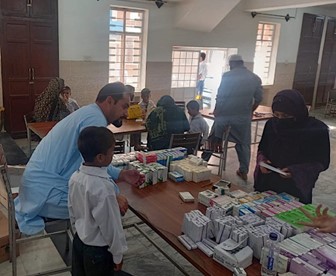 Figure 1: Medical camp organized by Family Medicine department at Zamung Kor instutute
Figure 1: Medical camp organized by Family Medicine department at Zamung Kor instutute
Department of family medicine at Khyber Medical University, in collaboration with Pakistan Life Savers Programme and Student Welfare Society (SWS) arranged basic life support workshop for final year medical students at one of the medical colleges KMU Institute of medical Sciences in Kohat. Hands on workshop was conducted by a team of basic life support trainers, comprising of a family physician and a cardiologist.
Proceeding to the Punjab province in Pakistan, a number of community-based activities were conducted by the department of Family Medicine at University of Health Sciences (UHS) Lahore. Dr Hina Jawaid conducted breast cancer awareness sessions in multiple institutions (Medical and Allied health, other universities) for undergraduate medical and non-medical students. These sessions were held throughout the month of October and were open for people from every walk of life. A free session was held during these awareness talks on how to do breast self-examination, know what is normal and what abnormalities to look for . Breast cancer survivors were also invited to these sessions who shared their stories of pain, strength and perseverance. Information leaflets in the local language were developed and distributed among participants. A pinkotober event at a software development company was arranged on the same lines.
An original article titled “Breast Cancer Knowledge Among Health Professionals: a pre-post knowledge based intervention study” has been published recently in Journal of Family Medicine and Primary care2.
An interactive session was conducted on World Heart Day, 29th Sept, 2022, by the Department of Family Medicine at UHS. The target group was undergraduate and postgraduate students of UHS. Risk factors leading to cardiovascular diseases were discussed. The focus was primarily on preventing diseases and early death due to non-communicable diseases. On random checking of blood pressures, 2 students in their early 20’s were found to have high BP. Further investigations and management was arranged.
Figure 2: session on World Heart Day
In addition to above, an already established Family Medicine health center in a peri-urban area of Lahore was made functional by the department of Family Medicine, UHS in September 2022. It has an out-patient clinic, a treatment room with supply of medications (oral and intravenous) and equipment for minor trauma, basic life support, cardiac arrest etc. There are mannequins for teaching basic life support to healthcare workers. A mental health counselor and nutritionist have been included to offer help and support for mental health and malnutrition related issues. The health center also focuses on prevention and early identification of non-communicable and communicable diseases.
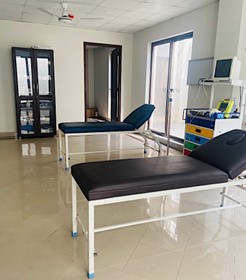 Figure 3: Medical centre run by department of Family Medicine at Jinnah Campus, UHS
Figure 3: Medical centre run by department of Family Medicine at Jinnah Campus, UHS
Participating in a 3 day family medicine conference, academicians shared their teaching and training experiences of post graduates in family medicine over the past years. Evidence based practices in primary care, outcome of 1 year bridging training programme in family medicine were some of the talks in the session held on 30th Oct 2022.
References:
1. Macrotrends, Infant Mortality Rate, https://www.macrotrends.net/countries/PAK/pakistan/infant-mortality-rate
2. Rehman, Huma T.1; Jawaid, Hina2; Tahir, Aisha3,; Imtiaz, Misha4; Zulfiqar, Tehzeeb5; Aziz, Tariq6. Breast cancer knowledge among health professionals: A pre–post-knowledge-based intervention study. Journal of Family Medicine and Primary Care: September 2022 - Volume 11 - Issue 9 - p 5649-5655 doi: 10.4103/jfmpc.jfmpc_1226_22
Exemplar 2: Arogya Arali, a partnership with local government to systemically strengthen rural primary health care in Karnataka, India
Written by Nymisha Herrera Nimmagadda, Public Health Consultant
Arogya Arali aims to strengthen the delivery of rural primary care through enhanced convergence of Gram Panchayats (GPs) and Primary Health Centers (PHCs). This would be achieved through a system that integrates community health profiles to improve healthcare planning and bring home-based primary care to the communities as well as empower local bodies and existing partnerships at the panchayat level. It is a multistakeholder partnership among the Karnataka Rural Development and Panchayat Raj Department, the Academy of Family Physicians of India (AFPI) Karnataka, and civil society and private organizations to achieve greater coordination in improving the health of communities. This process of decentralization of population and community health will make development locally sensitive and participatory thereby, improving health equity, resilience and efficiency.
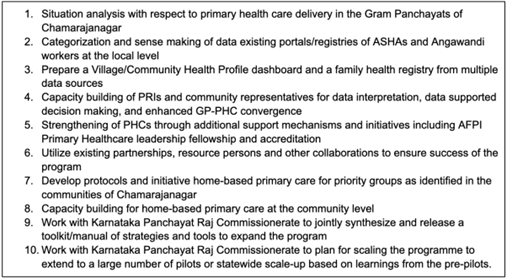 Figure 4: Image of MOU - Purpose of cross-sector initiative to strengthen local governments towards delivery of decentralized primary care
Figure 4: Image of MOU - Purpose of cross-sector initiative to strengthen local governments towards delivery of decentralized primary care
The pilot includes 6 intervention and 6 control GPs in the Chamarajanagar district to accurately measure whether the initiative can improve the Panchayat Raj Institution’s capacity to gauge public health requirements, expand access to healthcare services and leverage community networks to meet the needs of the most vulnerable populations in their communities. After 6 months, a strategic and operational report will be developed with in-depth processes to expand the program to a larger number of villages statewide.
Focus group discussions have been held across 12 Gram Panchayats and 3 PHCs as a qualitative approach to gain an in-depth understanding of the health status of the community. The meetings were attended by all healthcare staff including ASHA workers, Field Nurses, Community Health Officers, Health Inspectors and Primary Care Doctors. The discussions were focused on staff experiences across different regions, community trust, observations in health patterns and behaviors and feedback on how to improve health service delivery. The engagement was overwhelmingly positive and the staff are energized about the initiative and its potential to support local administration in improving health outcomes.
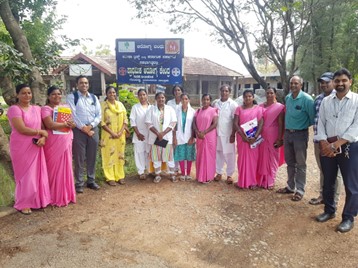 Figure 5: An image of AFPI team and Gumballi PHC staff after a focus group discussion in Gumballi, Karnataka
Figure 5: An image of AFPI team and Gumballi PHC staff after a focus group discussion in Gumballi, Karnataka
A preliminary data process was developed and shared with the health teams for data entry. The community health data has been analyzed against state and national averages to understand disease prevalence and comparative health outcomes, and develop a situation analysis. In addition, meetings are scheduled with the Gram Panchayat Task Forces that include government representatives, GP elected members and community leaders and representatives to enhance data-driven decision making at the village level. Sonata software is providing automation of data entry and availability of data at frequent intervals for real-time decision making.
Additionally, the initiative will bring home-based primary care for early childhood disability, adolescent girls, maternal health, elderly, and members of the community with limited ability to access health centers. Protocols have been developed based on the data and feedback from GPs and PHCs, and training will be led by the AFPI clinical team with a focus on cross-functional mutual learning. Implementation of the home-based care will be led by the PHC clinical staff with periodic meetings across PHCs to discuss successful strategies and provide feedback to AFPI teams.
Due to Arogya Aali, a village health profile and dashboard will be available across multiple domains including demographics, health insurance enrollment, NCDs, infectious diseases, maternal and child health, disability and mortality. The initiative will lead to greater convergence of GPs and PHCs with communities at the center of the decision making process. It would also enable GPs to better identify and address the health needs of their communities and facilitate health systems learning from one another at the village level.
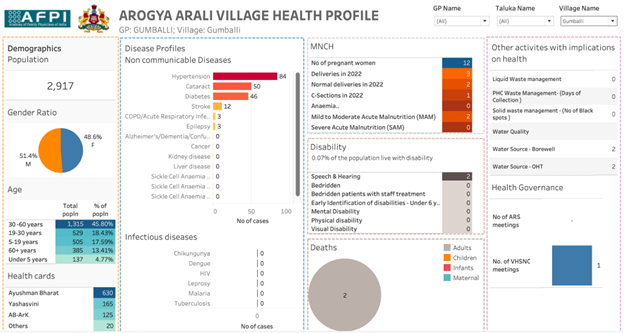 Figure 6: Sample village health profile dashboard to be used by Gram Panchayat Task Force and Administration towards data-driven decision making
Figure 6: Sample village health profile dashboard to be used by Gram Panchayat Task Force and Administration towards data-driven decision making
The multidisciplinary AFPI team includes Dr Ramakrishna Prasad (President, AFPI, Karnataka), Dr Ashoojit Kaur Anand (Lead, Arogya Arali), Pawan Kaipa (Director, Operations), Nymisha Herrera Nimmagadda (Lead, Public Health Consultant), Nirali Patel (PhD Student, Biostatistics, University of Minnesota), Dr Prathamesh Sawant (Clinical Pharmacist) and Dr Praneeth Pillala (Family Physician).
Exemplar 3: Improving collaborations with academic institutions and family physicians to promote healthy aging - 3rd AFPICON, Karnataka
Written by Dr. Harshapriya Jyothinagar, Family Physician and Palliative Medicine consultant with special interest in Geriatrics; General Secretary, AFPI Karnataka
In 2019, the number of people aged 60 years and older was 1 billion globally. This number will increase to 1.4 billion by 2030 and 2.1 billion by 2050 (WHO). This increase is occurring at an unprecedented pace and will accelerate in coming decades, particularly in developing countries. India is considered a young country but according to the United Nations, the number of Indians aged 60 and over will double by 2050, constituting about 20% of the total population.
Aging presents both challenges and opportunities. It will increase demand for primary health care and long-term care, require a larger and better trained workforce, intensify the need for physical and social environments to be made more age-friendly. In addition, aging has significant social and economic implications in terms of direct medical and social care costs, and the costs of informal care. According the WHO Global Strategy on Aging and Health, 2016-2020, the key areas of focus are:
● change how we think, feel and act towards age and aging
● ensure that co mmunities foster the abilities of older people
● deliver person-centered integrated care and primary health services responsive to older people
● provide access to long-term care for older people who need it
Family Physicians are the first point of contact and can proactively assist the elderly in facilitating health and positive aging. Through preventive care and early diagnosis, serious illnesses can be avoided, thereby reducing financial and economic burden on the population.
To highlight and enhance this process, AFPI Karnataka, one of the largest state chapters, is organizing the 3rd State conference of Academy of Family Physicians of India, Karnataka (AFPICON KA), where healthy aging is a central theme. The AFPI team identified the key areas of focus including dementia, positive and healthy aging and physical therapy in geriatrics and forged close collaborations with Dr Prathibha Peirera, Professor & Head of Department of Geriatrics at JSS Medical College, Mysuru, India, to develop the framework for learning and knowledge sharing. In addition, multidisciplinary panel discussions with neurology, psychiatry, orthopedics and physical therapy, family medicine and geriatrics are being held to further discuss the observed health patterns in this population.
The conference will serve as an example of a multidisciplinary approach to better understand and support the aging population. The focus of Family Physicians on the 6 pillars of Aging (Physical,Nutritional,Spiritual,Emotional,Mental and Intellectual), with the support of academia can facilitate the development of a robust model that would support individuals and communities. This process will instill a great deal of confidence in an aging individual, which is beneficial to their wellbeing. This approach will enable aging with grace in spite of comorbidities and lead to healthy progression of age.